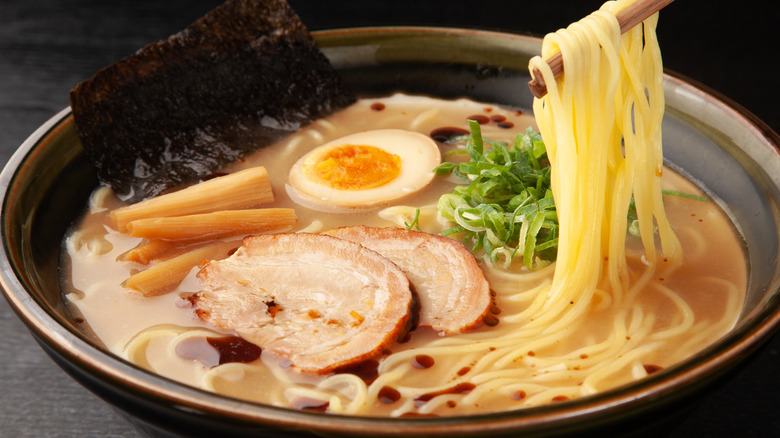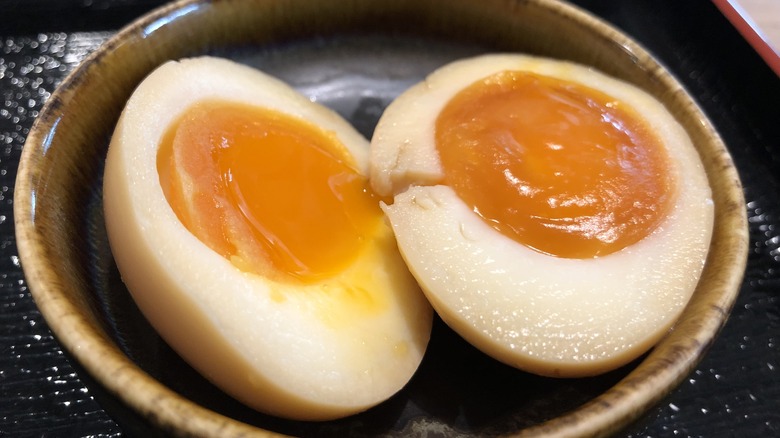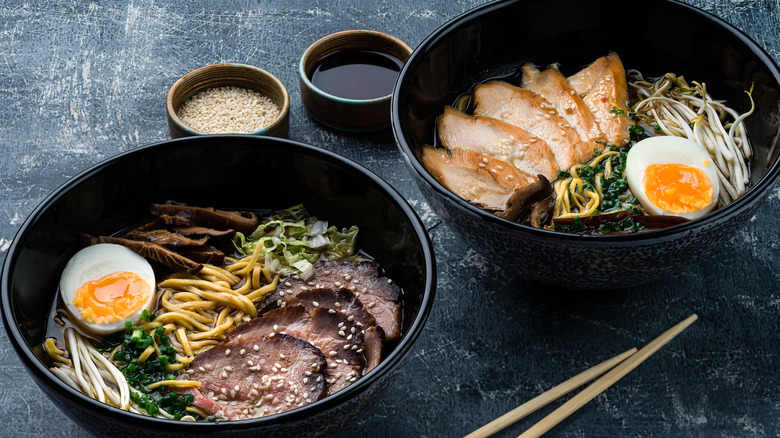Jammy, Soy Marinated Eggs Are A Must For The Perfect Ramen
The perfect remedy for a cold day (or any day when the craving strikes) is a deep bowl of steaming hot ramen, with a rich, flavorful broth. Beyond the chewy wheat noodles and soup stock, whether it be shoyu, tonkotsu, miso, or another variety, any ramen lover knows how much the toppings matter. In particular, soy-marinated eggs are a key component of a delicious homemade bowl.
If you've had your fair share of Japanese ramen, you'll know these ramen eggs called ajitsuke tamago or shoyu tamago, which add a pop of color, deeply umami flavor, and contrasting textures to your soup. A large part of the allure is that the eggs are soft-boiled to jammy yolk perfection, which makes them creamy and melt-in-your-mouth. To achieve the texture and taste, they're cooled immediately after boiling, peeled, then transferred to a soy marinade consisting of soy sauce and other ingredients including mirin (a Japanese sweet rice wine), sugar, and spices like ginger, garlic, or red chili flakes. The eggs are then allowed to marinate in the fridge to soak up all the savory goodness before slicing in half and serving as a beloved topping for ramen.
How to make your own ramen eggs
To make your own shoyu tomago, first start by bringing a large pot of water to boil. Carefully add in your eggs, adjusting the temperature as needed to maintain a gentle boil, just above a rolling simmer. Cook the eggs for 6.5 minutes to achieve a silky, creamy texture for the yolks while completely cooking the outer whites. As soon as your eggs hit the 6.5-minute mark, turn off the heat and remove your soft-boiled eggs from the water. Place the eggs in a prepared ice water bath to quickly cool them down and prevent overcooking. Then, remove their shells and rinse them with cold water.
Once your eggs are peeled, it's time to make the marinade. To marinate five or six large ramen eggs, simply whisk together half a cup of soy sauce and one-third to a half cup of mirin. Toss in a tablespoon of sugar to balance out the salty and tangy flavors of the soy and mirin. Add any garlic, ginger, or pepper to add more pungency. Marinate the eggs in the mixture for about eight hours, but at least for four to soak up the flavors. If you anticipate marinating the eggs for a longer period (but no longer than 24 hours, or else they'll become tough), add in half a cup to a cup of water to dilute the marinade so your eggs don't become overly concentrated.
Recipe variations for the perfect hearty ramen bowl
To experience the flavor and soul-nourishing qualities of a bowl of ramen, compete with your favorite toppings including the ramen egg, you don't need to go out or order takeout — you can make your own at home. Though it might help to try a few Japanese ramen restaurants first — for research, of course. Once you have tried making your own soy-marinated ramen egg, beyond trialing different marinades to see what you like best (maybe more soy-forward is your thing, or perhaps you add a bit of sake into the mix), there's also the tasty matter of additional toppings.
Top your bowl of ramen with chasu (braised pork belly), dried seaweed, and mushrooms for a burst of savory flavors that will pair perfectly with your broth and complement the creaminess of the ramen egg yolk and elasticity of the noodles. If you're making a vegetarian version of the soup, the egg will be just what you need to provide that bit of extra protein. Add bok choy in and let it wilt under the soup's heat. Toss in corn for some sweetness, then garnish the whole thing with sliced scallions, chili oil, and a drizzle of sesame oil. Whatever toppings you choose (though the ramen egg is a must), be sure to enjoy every slurp of your soup.


